Julie Webb-Pullman: Not So Crackers After All
Not So Crackers After All
By Julie Webb-Pullman
A view from the top, Altamira, the first of the middle class suburbs heading east. Saturday afternoon I went to a free jazz concert at La Estancia, a large ex-hacienda in this suburb later converted to a private park and venue, with entry fees. The beautiful grounds and buildings have now been taken over by PDVSA, the nationalised petroleum company, and turned into an arts centre with free concerts and exhibitions, or where people can just come in and enjoy some respite from the Caracas cacophony in the green oasis of the now-public gardens.
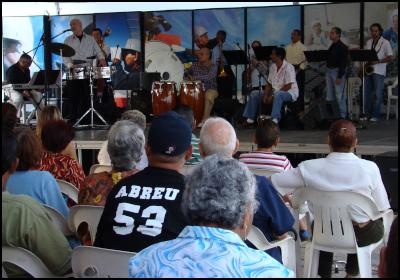
Click to enlarge
Alberto Naranjo Latin Jazz Combo
Hundreds of locals turned out, and the musos were no slouches either – nationally and internationally renowned musician Amberto Naranjo and his Latin Jazz Combo served up an eclectic afternoon of top shelf entertainment equal to that at any high-class international event – after all, this guy has collaborated with artists from Tom Jones and The Platters to Tito Puente and Arturo Sandoval. With two trumpets, two saxes, a trombone, keyboard, and three percussionists they quickly had the audience of mostly middle-class over-50s tapping along.
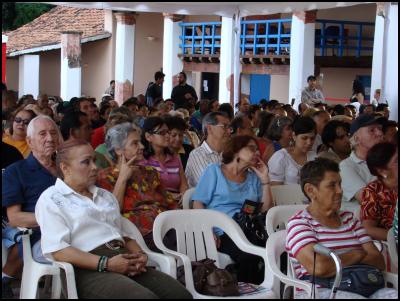
Click to enlarge
Audience at Altamira jazz concert
In one of the many ironies of life here, Altamira is overwhelmingly NOT Chavista, although its residents are more than happy to enjoy the benefits of the changes he has wrought. In fact, feeling here runs so strong that when two friends wearing red Chavez t-shirts went into a cafe, a man at the door pointed his finger at them and drew his finger across his throat – and did it again when they left!
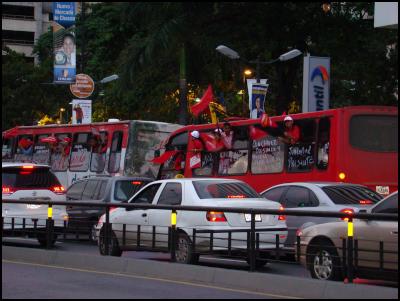
Click to enlarge
Caravana in Altamira
Equal parts victims of distorted media campaigns of the right and of their own greed, many of the middle and upper class seem unable to appreciate that they also are accruing considerable social and ethical gains, not least from access to culture such as the PDVSA concert, but also through the universally-acknowledged vast improvements in public sanitation and public security that have seen both rubbish and crime decline substantially in Caracas.
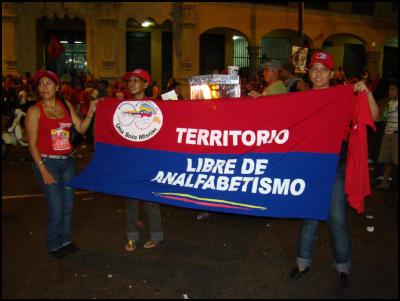
Click to enlarge
Illiteracy-Free Zone
Others within their sector have the nouse to see that the social gains resulting from more equitable distribution of the nation's wealth are well worth it from every point of view, forming groups such as "Middle Classes for Chavez" and working actively to convince more of their ilk to join the socialist project. (The work of such groups demands more depth than can be given here, and will be covered in a separate article.)
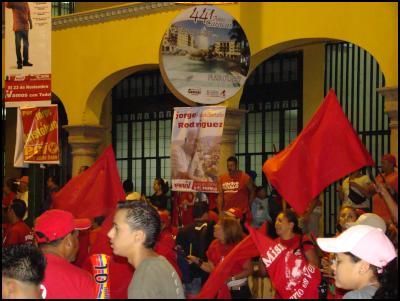
Click to enlarge
Rally at El Silencio
Going from Altamira to Guaicapuro, via a rally of several thousand at El Silencio in central Caracas, accentuated the underpinning of what this Venezuelan revolution is all about. The sedate comfort of Altamira sat in stark contrast to the screaming chanting dancing crowds at El Silencio vociferously asserting their right to participate fully in the life of their country. (see video Venezuela Rally www.latinamericasoldarity.org)
And Guaicapuro illustrates why they were there. Houses built on top of each other, tumbling down the hillsides, constructed from whatever was at hand and wherever there was a space, by people with no jobs, no money, no land, and no hope. Alleys wind between the concrete, brick and block leading to more of the same in seemingly every direction. Ten years ago this area was a no-go, murder a daily event, crime, drugs, few services, not even lights to see your way through the maze of paths and concrete steps
Now, local resident "Jorge" assures us, there is virtually no crime at all, because everyone is either studying or working. The Cuban-designed and delivered project that eliminated illiteracy in three years is largely why. "Ten years ago people would conceal what they were carrying in case they were robbed, but now you see people really proudly carrying books. It's not only a sign that they can read now, but also that they are reading – everyone is reading, old people, kids, everyone." Free education, and the establishment of free universities, has seen delinquency drop to almost nil. "The kids are too busy now, they have too much to do to get into trouble!"
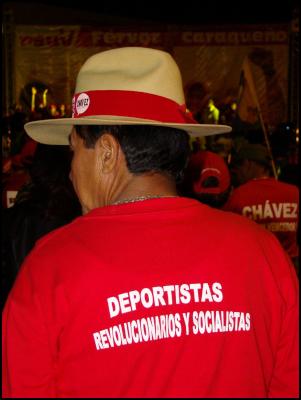
Click to enlarge
Revolutionary Socialist Sportspeople
Increased employment has also played a significant role, both formal and informal. Jorge, like employees of many workplaces, spends his Sundays doing voluntary work in one of the many missions or neighbourhood projects, with obvious results. From local co-operatives to medical clinics, the people are making enormous efforts to improve their communities. Jorge pointed out all the yellow 'streetlights' we could see around the barrio, external lights on the sides of houses. "Before, it was just pitch black, no-one could afford to pay for lights outside. Now, the government subsidises them – they pay 75% of the electricity bill so many people have been able to put them outside their houses to make it safer for everyone."
In a country where there is no income tax, this spirit of co-operation both between people, and between the people and the Government, is essential for the success of social and political reforms, and is constantly raised by Chavistas as the raison d'etre of the revolution. It is its defining characteristic – people's commitment is not just for personal gain, but to emphasise and recapture the humanity and community they had come so close to losing entirely.
For people raised in the barrio such as Jorge, the opportunity to go to university would have been impossible 20 years ago. Today he and others like him can not only study and become qualified, but also get work. As a lawyer with a good job he could choose to put himself and his family first, and take the upwardly mobile path to Altamira. But as a man of humanity and principle, as a Chavista, he has chosen to stay and give back to the community of which he is a part. "Our struggle is not only for better housing, education, jobs or conditions – it is also to create a better way of living together - with respect, with equality, and with humanism. There are a lot of lies being put out about what Chavez is doing, what Chavismo wants to achieve. It is very important to us that the world understands that this is what we are trying to do – to create a fair society, with heart and humanity." Who could say NO to that?


 Keith Rankin: Invoking Munich, 'Appeasement', And The 'Lessons Of History'
Keith Rankin: Invoking Munich, 'Appeasement', And The 'Lessons Of History' Peter Dunne: Dunne's Weekly - School Lunches Fiasco Shows What Happens When Social Policy Loses Focus
Peter Dunne: Dunne's Weekly - School Lunches Fiasco Shows What Happens When Social Policy Loses Focus Gordon Campbell: On The Government’s Stubborn Refusal To Invest For Growth
Gordon Campbell: On The Government’s Stubborn Refusal To Invest For Growth Binoy Kampmark: Aggrieved Speculation - The Trump Illness Hypothesis
Binoy Kampmark: Aggrieved Speculation - The Trump Illness Hypothesis Keith Rankin: Dodgy Democracy, The Fiscal Double Standard, And The Application Of The Domino Theory To Ukraine
Keith Rankin: Dodgy Democracy, The Fiscal Double Standard, And The Application Of The Domino Theory To Ukraine Gordon Campbell: On Why GP Practices Are In Crisis
Gordon Campbell: On Why GP Practices Are In Crisis